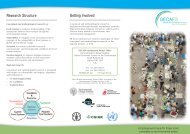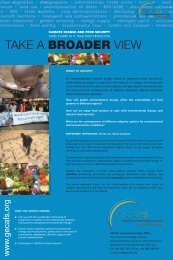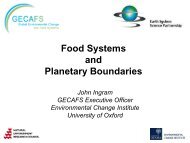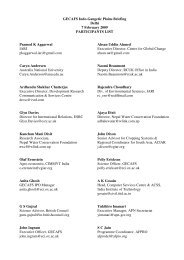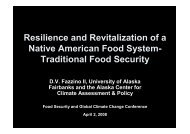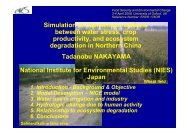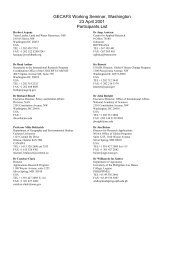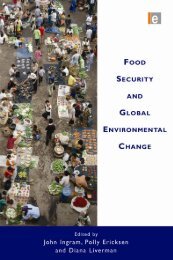an average of two years <strong>to</strong> coalesce. The core team did not foresee that it would take this longfor scientists from different institutions and different disciplines <strong>to</strong> successfully work <strong>to</strong>getherin a regional mode, but on global questions. In hindsight this seems naïve, but at the time allthe scientists were focusing on the contents of the research and just did not think about whatit takes <strong>to</strong> build a team in one location (let alone in multiple locations in parallel). Thetransaction costs of learning <strong>to</strong> work <strong>to</strong>gether at each benchmark site were compounded bythose associated with the need for overall coordination and communication. The differentteams at each site consisted of scientists from research institutions (national andinternational), from NGOs and from universities. Some had previous experience withparticipa<strong>to</strong>ry research methods; others had none. It quickly became obvious that it wasessential <strong>to</strong> reconcile the objectives of the programme with the expectations of each teammember at a given site. The differing roles of these participants required almost constantrenegotiations on the part of the overall coordina<strong>to</strong>r.One dimension of the ASB approach, the use of ‘standardized’ methods at each site <strong>to</strong>facilitate cross or interregional analyses of results, proved difficult <strong>to</strong> implement at first. Eachbenchmark team considered that the set of methods proposed by the programme needed <strong>to</strong> besignificantly amended <strong>to</strong> account for the particularities of their own site. The analysis of dataacross the benchmark areas and the global results were indeed not a very strong motivationfor some of these teams, until it was agreed that the global or cross-site analysis would beundertaken by all interested scientists, no matter whether they were located at a given site orwere part of the initial core team. A geo-referenced database was developed <strong>to</strong> facilitate thesynthesis of results and the sharing of information across the regional teams. After a fewyears of data collection at each benchmark area, and once some of the regional results startedbeing analysed from a global perspective, the regional teams became almost more interestedin the global analysis than in the production of a full analysis of their own data.Using integrated scenario analyses for facilitating regional-level analysesScenario development and analysis has already been successfully used at a global level <strong>to</strong>help reveal and address knowledge gaps about the plausible future interactions between GECand a number of ecosystem goods and services, e.g. food production or water availability orclimate regulation. Such studies are often called ‘integrated’ as they include (i) social,economic and environmental processes and scientific disciplines; (ii) cover multiple levels onmultiple scales; and (iii) strongly involve stakeholders. Such scenarios can be eitherqualitative (s<strong>to</strong>ries) or quantitative (models) or both.Scenario analyses conducted at the regional level help <strong>to</strong> systematically explore policy andtechnical options at the appropriate level by providing a suitable framework for (i) raisingawareness of key environmental and policy concerns; (ii) discussing viable adaptationoptions; and (iii) analysing the possible consequences of different adoption options for foodsecurity and environmental goals. These can be based on scenarios developed at the globallevel (e.g. the Intergovernmental Panel on Climate Change (IPCC) Special Report onEmissions Scenarios (IPCC, 2000); the Millennium Ecosystems Assessment (MA, 2005) and94
the UNEP’s <strong>Global</strong> Environment Outlooks (GEO-3 and GEO-4: UNEP, 2002, 2007), butsuch analyses do not necessarily feature issues that are of particular relevance at the givenregional level (Zurek and Henrichs, 2007).Downscaling global scenarios <strong>to</strong> national (or even local) level has been considered by anumber of authors (e.g. Lebel et al., 2006; Biggs et al., 2007; Kok et al., 2007) but, while acommonly agreed approach is still lacking, downscaling methods and theories are becomingmore common (e.g. Zurek and Henrichs, 2007). Upscaling has, however, proven <strong>to</strong> be moredifficult and remains one of the largest challenges. Some argue that global downscaling limitsthe creativity and diversity of regional scenarios and call for more upscaling efforts. Othersargue that upscaling will fail because of the lack of a common framework in terms of drivers,time horizon, definitions etc. (see Alcamo et al., 2008). So, while there are a large number ofdetailed global scenarios available, their potential has been undervalued for developingscenarios at regional level.The current state-of-the-art is <strong>to</strong> embark upon a cross-level methodology in which globalscenarios are first downscaled and used <strong>to</strong> produce regional or local scenarios without beingprescriptive, after which local scenarios are used <strong>to</strong> enrich the existing global s<strong>to</strong>rylines in aniterative procedure, often using qualitative s<strong>to</strong>rylines as well as quantitative models. Creatingregional scenarios is not just a matter of ‘downscaling’ the information available in globalscenarios (e.g. climate change projections) for regional use; some information (such as trendsin trade) will have been built up from lower levels. Other information will be new and willneed <strong>to</strong> come directly from the region in question (Zurek and Henrichs, 2007). Regional‘s<strong>to</strong>rylines’ of plausible futures can share some of the key assumptions with global-levels<strong>to</strong>rylines, i.e. be coherent with global assumptions, yet regionally ‘enriched’, as was the casefor the GECAFS Caribbean exercise (Box 3). Similarly, the Southern African Sub-<strong>Global</strong>Assessment (SAfMA) (Biggs et al., 2004) adapt existing scenarios, stressing governance as amajor driver and developing two regional s<strong>to</strong>rylines, African Patchwork and AfricanPartnership. These can be mapped <strong>to</strong> the MA <strong>Global</strong> Scenarios.Box 3 The GECAFS Caribbean Scenarios Exercise.In 2005, with funding from ICSU and UNESCO, GECAFS, in collaboration with FAO, UNEP, theMillennium Ecosystem Assessment and the European Environment Agency, developed the conceptualframeworks and methods necessary <strong>to</strong> formulate a set of pro<strong>to</strong>type scenarios for researching theinteractions between food security and environmental change at the Caribbean regional level. Thesescenarios were specifically designed <strong>to</strong> assist analyses of possible regional policy and technicalinterventions for adapting food systems <strong>to</strong> environmental change so as <strong>to</strong> explore the medium- andlong-term prospects for given adaptation options for food security. The innovative operationalframework was based on theoretical advances in the notion of food systems and their vulnerability <strong>to</strong>GEC, and downscaling global scenarios <strong>to</strong> regional level.The Caribbean scenarios exercise involved about 30 people including social and natural scientistsfrom regional research institutions (e.g. the University of the West Indies (UWI) and the Caribbean95
- Page 1 and 2:
From Food Production to Food Securi
- Page 3 and 4:
From Food Production to Food Securi
- Page 5 and 6:
Table of ContentsAbstract .........
- Page 7 and 8:
Paper 6: Undertaking Research at th
- Page 9:
AbstractFood security is a conditio
- Page 12 and 13:
2010 about 925 million people had t
- Page 14 and 15:
water) are used, and reduce negativ
- Page 16 and 17:
While the flow of the argument abou
- Page 18 and 19:
determine interactions along and be
- Page 20 and 21:
Paper 3: A Food Systems Approach to
- Page 23:
From Food Production to Food Securi
- Page 26 and 27:
concerns and are now issues that mu
- Page 28 and 29:
the relationships between GEC and f
- Page 30 and 31:
Theme 2 aims to understand how comm
- Page 32 and 33:
GEC and the Food System of the Indo
- Page 34 and 35:
Paper 2: The role of agronomic rese
- Page 36 and 37:
These advances have resulted from a
- Page 38 and 39:
Crop selection to determine mechani
- Page 40 and 41:
Agronomic science is central to imp
- Page 42 and 43:
Agronomic research in relation to f
- Page 44 and 45:
The discussion above identifies a n
- Page 46 and 47:
interventions and political inertia
- Page 48 and 49:
While research on producing food ha
- Page 50 and 51:
Box 1 Food system Activities and fo
- Page 52 and 53:
In addition to broadening the debat
- Page 54 and 55: options. Examples already seen rang
- Page 56 and 57: Figure 3 Outcomes for 10 variables
- Page 58 and 59: Figure 4 Nine ‘planetary boundari
- Page 60 and 61: Figure 5 Environmental change, food
- Page 62 and 63: Table 1: Indicative analysis of the
- Page 65: From Food Production to Food Securi
- Page 68 and 69: Trade Agreement (NAFTA) and the Eur
- Page 70 and 71: Parry et al., 2005). Conducting foo
- Page 72 and 73: is provided in the ESF/COST Forward
- Page 74 and 75: Paper 5: Engaging Stakeholders at t
- Page 76 and 77: into actions (strategies, policies,
- Page 78 and 79: Box 2 Engaging with stakeholders in
- Page 80 and 81: Box 3 Setting the research agenda f
- Page 82 and 83: Third, and of considerable practica
- Page 84 and 85: Figure 2: Organizing and understand
- Page 86 and 87: organizations made up of numerous n
- Page 88 and 89: Elements of good practice in stakeh
- Page 90 and 91: Finally, it is worth noting that fo
- Page 92 and 93: development (Lee, 1999; Gunderson a
- Page 94 and 95: Box 7 The GECAFS stakeholder survey
- Page 96 and 97: ‘break down’ what might be a hi
- Page 98 and 99: Paper 6: Undertaking Research at th
- Page 100 and 101: agriculture in many parts of the wo
- Page 102 and 103: gaps. The presence of a strong tech
- Page 106 and 107: Institute for Meteorology and Hydro
- Page 108 and 109: Identifying case study sitesResearc
- Page 110 and 111: can both benefit from and contribut
- Page 112 and 113: Box 5 Mapping stakeholder interests
- Page 114 and 115: Holding planning meetings in locati
- Page 116 and 117: This reorientation of the debate fr
- Page 118 and 119: Importance of this type of research
- Page 120 and 121: Integrating the food system concept
- Page 122 and 123: awareness of the GEC issues within
- Page 124 and 125: pollutants were then introduced as
- Page 126 and 127: communities operating in food syste
- Page 128 and 129: Improving input-use efficiency acro
- Page 130 and 131: governance focuses on the range of
- Page 132 and 133: Developing research agendas in supp
- Page 134 and 135: The renewed approach to interdiscip
- Page 136 and 137: BIELAK, A., HOLMES, J., SAVGÅRD, J
- Page 138 and 139: EAKIN, H. 2010. What is Vulnerable?
- Page 140 and 141: GODFRAY, H. C. J., BEDDINGTON, J. R
- Page 142 and 143: INGRAM, J. S. I. & FERNANDES, E. C.
- Page 144 and 145: LYUTSE, S. 2010. The One Billion To
- Page 146 and 147: RAYNER, S. & MALONE, E. L. 1998. Hu
- Page 148 and 149: UNDP 2006. The 2006 Human Developme
- Page 150 and 151: activities “from plough to plate
- Page 152 and 153: contribution to the science agenda:
- Page 154 and 155:
urgently needed, and - given the gr
- Page 156 and 157:
GECAFS plannenmakerij stelde vast d
- Page 158 and 159:
ieder hun eigen groep van betrokken
- Page 160 and 161:
het gebied van beheer hebben betrek
- Page 162:
Curriculum VitaeFollowing a BSc in



